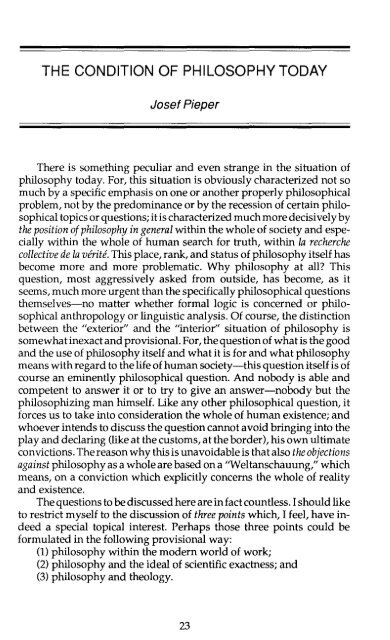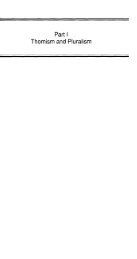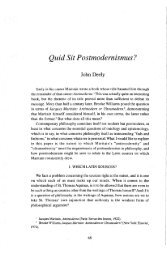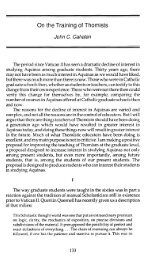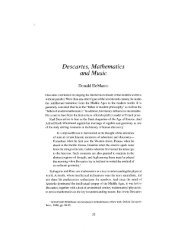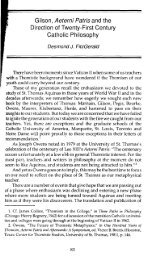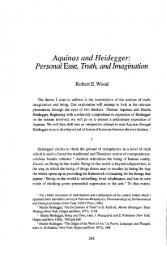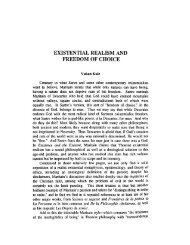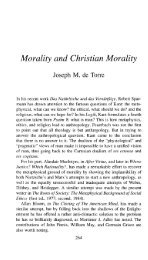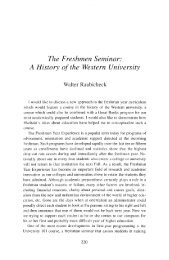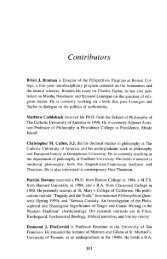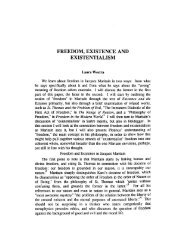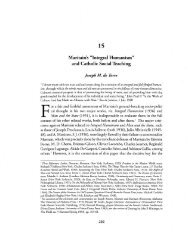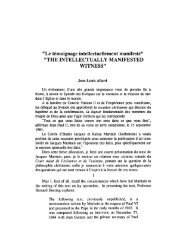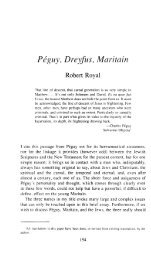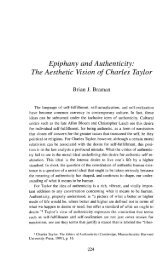Josef Pieper - Jacques Maritain Center
Josef Pieper - Jacques Maritain Center
Josef Pieper - Jacques Maritain Center
Create successful ePaper yourself
Turn your PDF publications into a flip-book with our unique Google optimized e-Paper software.
THE CONDITION OF PHILOSOPHY TODAY<br />
<strong>Josef</strong> <strong>Pieper</strong><br />
There is something peculiar and even strange in the situation of<br />
philosophy today. For, this situation is obviously characterized not so<br />
much by a specific emphasis on one or another properly philosophical<br />
problem, not by the predominance or by the recession of certain philosophical<br />
topics or questions; it is characterized much more decisively by<br />
the position of philosophy in general within the whole of society and especially<br />
within the whole of human search for truth, within la recherche<br />
collective de la verite. This place, rank, and status of philosophy itself has<br />
become more and more problematic. Why philosophy at all? This<br />
question, most aggressively asked from outside, has become, as it<br />
seems, much more urgent than the specifically philosophical questions<br />
themselves no matter whether formal logic is concerned or philosophical<br />
anthropology or linguistic analysis. Of course, the distinction<br />
between the "exterior" and the "interior" situation of philosophy is<br />
somewhat inexact and provisional. For, the question of what is the good<br />
and the use of philosophy itself and what it is for and what philosophy<br />
means with regard to the life of human society this question itself is of<br />
course an eminently philosophical question. And nobody is able and<br />
competent to answer it or to try to give an answer nobody but the<br />
philosophizing man himself. Like any other philosophical question, it<br />
forces us to take into consideration the whole of human existence; and<br />
whoever intends to discuss the question cannot avoid bringing into the<br />
play and declaring (like at the customs, at the border), his own ultimate<br />
convictions. The reason why this is unavoidable is that also the objections<br />
against philosophy as a whole are based on a ''Weltanschauung," which<br />
means, on a conviction which explicitly concerns the whole of reality<br />
and existence.<br />
The questions to be discussed here are in fact countless. I should like<br />
to restrict myself to the discussion of three points which, I feel, have indeed<br />
a special topical interest. Perhaps those three points could be<br />
formulated in the following provisional way:<br />
(1) philosophy within the modern world of work;<br />
(2) philosophy and the ideal of scientific exactness; and<br />
(3) philosophy and theology.<br />
23
24 • JOSEF PIEPER<br />
Before I try to discuss these points one after the other I should like to say<br />
as clearly as possible, in which meaning the term philosophy shall be used<br />
here whereby I explicitly resign any claim of originality. By philosophy<br />
I understand nothing else than that which the great traditional ways<br />
has understood by it, namely: the consideration of (perhaps I should<br />
rather say: the attempt to take into consideration) the entirety of what we<br />
encounter and meet with. But I think it might be good to elucidate a bit<br />
more the three main elements of this description, which perhaps may be<br />
called even a definition of philosophy. These three elements are the<br />
terms consideration, entirety (totality) and encounter. All of them express<br />
somethingwhichseemstometobeamatterofrathergreatconsequence.<br />
First: "consideration" (or: to take into consideration) means something<br />
like this: that, with a kind of amazement and astonishment, I keep<br />
awake a question; consideration is at any rate rather the search after an<br />
answer than its discovery. This term consideration excludes from the<br />
beginning the opinion that philosophy could be something like a<br />
positive "doctrine" (for instance the doctrine or theory of being as such,<br />
of being as being). With this it is already clear, that this concept of<br />
philosophy is fighting in two directions: first against the idea of "scientific<br />
philosophy'' which maintains or postulates that the philosophizing<br />
man ought to bring to bear the principles of the exact sciences within the<br />
field of philosophy; but it also stands against the claims of the speculative<br />
"system-philosophy," which understands itself as "the comprehension<br />
of the Absolute" (as Hegel says) or as "the science of the eternal<br />
archetypes of things" (as Schelling puts it). Further, when I said, the<br />
philosophizing man should have to deal with the entirety and the totality<br />
(of what we encounter), this does not mean that a truly philosophical<br />
question would be asked only in that case, in which the totality of world<br />
and existence is formally made the topic and the theme of discussion;<br />
but it does mean that the topic of a philosophical question, however<br />
concrete or particular this topic may be, has to be viewed against the<br />
horizon of the whole of reality and that the object has to be considered<br />
under every possible aspect (whereby it may be left open and undetermined<br />
just what a "possible aspect'' is).<br />
I am speaking here of exactly the same thing as Alfred North<br />
Whitehead had in view, when he said: thatthe specifically philosophical<br />
problem, which never will be solved definitely and once for all, consists<br />
in this: to conceive a complete fact; I could also say: to conceive a fact<br />
completely. Thirdly, I said that philosophizing means the consideration<br />
of all we encounter and meet with. By this I wish to emphasize the necessary<br />
relation of philosophy with experience, but at the sa me time I try to<br />
exclude any limitation and restriction to what usually is called the<br />
•
THE CONDITION OF PHILOSOPHY TODAY • 25<br />
empirical fact in the plain and compact sense. I can possibly encounter<br />
something, which I do not simply experience. That which I encounter is<br />
something which offers resistance; possibly it does not show itself, and<br />
I cannot simply observe or state it, but nevertheless I am not able to<br />
discuss it away. I can possibly ignore it for a while or I can misinterpret<br />
it let us say out of somevitalorideologicalinterest. But, in the longrun,<br />
and if I do not completely turn away the eyes of my soul, it brings itself<br />
to my recollection if only with some scruples (as with fish hooks);<br />
uncompromisingly and stubbornly it presents itself to my look. And I<br />
should say whatever our cognition encounters in this manner is the<br />
subject-matter of philosophy, only this and all this.<br />
These previous remarks have not only, as I hope, made it somewhat<br />
more conceivable how and why it could happen that the position of<br />
philosophy and its relation to the modern world of work, to the exact<br />
empirical sciences, and to theology became problematic at all; they have,<br />
moreover (which, I hope, shall become evident later on), paved the way<br />
a bit for an answer, which may show and advocate the independence of<br />
philosophy as well as its necessity.<br />
I<br />
The objection against philosophy from the side of the modern<br />
working world is, considered as a theoretical argument, not especially<br />
impressive; its weight lies in its practical, life-determining power. The<br />
objection, put into an abbreviating formula, goes like this: philosophizing<br />
is senseless and, above all, disadvantageous and detrimental, because<br />
it does not serve for anything and even hinders the active realization<br />
of the aims and needs oflife. This argument has, so to speak, several<br />
different degrees of radicality and, of course, it does not at all need to be<br />
formulated always explicitly. Those degrees may reach from the naive<br />
involvement in the workaday practice to the deliberate claim, that the<br />
bonum utile, the mere utility should be something absolute and, what is<br />
the same, to the explicit indifference to truth. The most extreme case is<br />
the practitioner of power, resisting every "useless" knowledge.<br />
First of all, one ought to see that the emergence of the modern<br />
working world cannot be attributed to mere human wantonness; on the<br />
contrary, it is something simply unavoidable and so far something<br />
legitimate. Mankind is indeed confronted, up to a quite new degree,<br />
with the task of securing the means of existence; and it is not only the<br />
fight against hunger which forces us to make the most intense use of all<br />
energies available, it is also the preservation of political freedom, which<br />
rightly requires all our capacities. Sometimes one may be tempted, quite
26 • JOSEF PIEPER<br />
understandably, to ask oneself whether it is really right to insist on the<br />
claim that it nevertheless belongs to the elements of a truly human life<br />
to keep present and alive the question of the ultimate meaning of the<br />
whole of reality, which means: to philosophize.<br />
On the other hand: the strangeness of the philosophical act within<br />
the modern working world is nothing but a sharper degree of that<br />
incommensurability that exists ever since between philosophy and the<br />
normal practice of everyday. Normally, man does not feel in the mood<br />
to ask for the ultimate meaning of reality as a whole. As long as our<br />
attention is absorbed by the active realization of purposes, we are not in<br />
the mood to consider philosophically the whole of existence. Whoever<br />
is conducting a case before the court,nonnallyis not just interested in the<br />
philosophical question what justice in general is. There is needed, ever<br />
since, a shock, a violent push, a concussion of the normal average<br />
attitude to world and life so that philosophizing, which means the<br />
consideration of the whole of reality may be put into motion at all. A<br />
concussion of this kind is for instance the experience of death, and also<br />
the other great power of existence, Eros, can possibly strike a man in<br />
such a way, that the pertinent occupation with the necessities and needs<br />
of daily life becomes suddenly unimportant to him or even impossible<br />
because the whole of existence comes into the picture. And indeed, man<br />
philosophizing has this in conunon with the other one, who has been<br />
shaken by the experience of death and also with that one who has been<br />
touched by the power of Eros and, by the way, also with the man in<br />
prayer and the poet, even with one who perceives and assimilates a<br />
poem in a poetical way, which means, in the only adequate way like<br />
all these figures man philosophizing, too, does not unquestionably fit in<br />
with the functioning of the workaday practice. Man philosophizing, too,<br />
sees things "different! y'' in comparison with the man of practice, who is<br />
engaged in the realization of purposes.<br />
Thisinadequacyanddiscrepancyhasexisted,aslsaid,eversince;and<br />
it will never disappear. There is, however, something new in the case ofthe<br />
contemporary working world. What is new is not only the sharper<br />
radicality of that quite natural incommensurability. New is the explicit<br />
theoretical (one might even say: philosophical!) argumentation, intended<br />
to show that philosophy, in the ancient sense, is something<br />
meaningless and even something unseemly; such argumentation is also<br />
intended to do away with that old incommensurability; but in fact it<br />
does away then with philosophy itself.<br />
This attempt, which after all is quite conceivable, has been undertaken,<br />
as it seems, at all times, at the latest since the sophists. But again,<br />
the radicality of this attempt has become always sharper. Obviously the
THE CONDITION OF PHILOSOPHY TODAY • 27<br />
sentence out of the Great Soviet Encyclopaedia, according to which the<br />
finalobjectiveof even the most abstractsciencesconsists in the satisfaction<br />
of the needs of society, this sentence, I think, is only a more radical<br />
formulationofDescartes'spostulate,thattheoldtheoreticalphilosophy,<br />
ought to be replaced by a new "practical" philosophy, which should<br />
enable us, to become the masters and owners of nature, maftres et<br />
possesseurs de la nature. And whenever in the totalitarian working state<br />
not only the sciences but also philosophy (or what passes for philosophy)<br />
has come into the trying situation of being forced to answer<br />
constant! y the inquisitorial question, what its contribution is to the Five<br />
Year-Plan, then, I should think, this is nothing but the strictest consequences<br />
of that Cartesian demand for a practical philosophy; and the<br />
dictator of the utility-plans in nothing but the contemporary modern<br />
form of the maftre et possesseur de a nature.<br />
This position, untheoretical on principle and based on pure will to<br />
power, clearly cannot be shaken by theoretical arguments. There is,<br />
however, one argument, an existential argument, so to speak, to which<br />
the human being, precisely within the totalitarian working world,<br />
seems to be extremely sensitive. The argument is: freedom.<br />
At this point it comes to light at the same time, that we ourselves<br />
have to think anew, at least to formulate anew one fundamental thought<br />
to the great philosophical tradition a thought which has, as it seems,<br />
more or less disappeared out of our range of vision. I am speaking of the<br />
Aristotelian thesis: that of all human activities the philosophical alone<br />
has the quality of freedom. This idea which at first sight indeed sounds<br />
somewhat strange, shows its enormous timeliness precisely in the<br />
confrontation with the totalitarian claim of the modern working state.<br />
This idea itself, to be sure, includes a whole philosophy of life, which<br />
cannot be explained here. But I must speak of two elements of that<br />
philosophy. The first element is the conviction that cognition of truth<br />
and freedom belong together in a very definite way; the second element<br />
is the conviction that the will to truth nowhere manifests itself more<br />
radically than in the philosophical act.<br />
Concerning point one, (freedom and cognition of truth), I should like<br />
to mention an experience I had some years ago in a discussion group<br />
with students from the totalitarian world. Almost incidentally one of the<br />
participants mentioned a Russian novel, at that time everywhere spoken<br />
of, today already more or less forgotten. The friends from the other side<br />
of the Iron Curtain said that this book could not be printed and<br />
published in their own country because the truth about the Russian<br />
Revolution allegedly had been grossly distorted. To this we replied:<br />
perhaps one could find out how things really are or not? Therefore, it
-- -----<br />
28 • JOSEF PIEPER<br />
is true, it would be indispensable to discuss the matter in question<br />
absolutely independently independent of every official direction and<br />
instruction. Moreover, a "free room" in the midst of society would be<br />
needed a range, in which such a discussion could take place without<br />
interference. This was the point at which several things suddenly<br />
became clear to all members of the group. First, it became clear what it<br />
means whether in a political community this "free room" does or does<br />
not exist a room, nota bene, within which all practical purposes and<br />
interests (be they collective or private, political, ideological, economical)<br />
are explicitly suspended. Moreover, it was suddenly evident for everybody,<br />
that this asylum, this place of immunity (in the old juridical sense)<br />
had certainly to be protected and guaranteed from outside, by the<br />
political power, but that, above all, the freedom of this asylum had to be<br />
made possible and even constituted from inside: by nothing but the will<br />
to truth, which is, and be it perhaps only for this one moment, interested<br />
exclusively in one thing: to find out how things really stand. That and<br />
how much this (this: to be able not only to think, but also to say, how<br />
according to one's own best knowledge things really are and stand)<br />
how much this means: freedom, not the whole of freedom, but a very<br />
essential indispensable piece of freedom. On this point we needed not<br />
waste a singe word, at that time, in Berlin. By the way; this freedom from<br />
any service of practical aimings and purposes, by this same freedom is<br />
meant the old concept of liberal arts; artes liberales, St. Thomas says (in his<br />
commentary on that same passage of the Aristotelian metaphysics),<br />
artes liberales are called only those human activities which are related to<br />
the knowledge of truth.<br />
But now we have to discuss the second element of that Aristotelian<br />
conception: Why and how should "theoria," how should this will to<br />
truth and nothing but truth be a distinguishing mark of philosophy? Does<br />
not every science aim at exactly this: to see things as they really are? Do<br />
not therefore science and freedom belong together in exactly the same<br />
way as freedom and philosophy?<br />
(As you see, at this point the topic ''Philosophy and Science" comes<br />
already into the play; and it is indeed not a mere chance, that the demand<br />
to nullify the distinction between philosophy and science has been<br />
proclaimed just on the basis of the modem working world.)<br />
We said, "theoria" in the old sense means that attitude toward<br />
reality, in which there is only one thing that matters: that man gets sight<br />
of reality and that things are seen as they really are. But since this<br />
manifestation of reality means exactly the same as truth (for truth is<br />
nothing but reality's coming to man's sight), therefore one can say also:<br />
the theoretical attitude to the world is directed to truth and nothing else.
THE CONDITION OF PHILOSOPHY TODAY • 29<br />
This will to truth, further on, manifests itself by silence; for, only the silent<br />
is able to listen. And in this consists the difference between philosophy and<br />
science: to philosophize means to listen so completely and totally, that<br />
this listening silence is disturbed or interrupted by nothing, not even by<br />
a question. Science, on the other hand, is not silent, it does ask a question.<br />
And it is precisely this question, explidtly formulated under a spedfic<br />
particular aspect, by which sdence constitutes itself as this spedal science.<br />
The sdentist explicitly wants to hear something quite definite,<br />
which lies within a fonnally limited range; and also his silence is only<br />
partly a silence; it is, in this sense, a particular silence. Butthe silence which<br />
has to be realized in the philosophical "theoria" (and the empirical<br />
individual never will succeed in realizing it perfectly), this silence should<br />
fill the soul entirely. This presupposes an unbiased openness, which is<br />
much more than the famous "scientific objectivity." It might rather be<br />
characterized by Goethe's formulation "complete renunciation of any<br />
pretension." Even more to the point would be the biblical phrase of the<br />
simplidty (or: singleness) of the eye: "If thy eye is single, the whole of thy<br />
body will be lit up" (Matt. 6. 22). The scientist, even if he would be<br />
hunting ever so passionately after a solution of a problem, the scientist<br />
need not be engaged to such a degree and not in the existential center of<br />
his person. That is to say, science is not to such an extreme degree<br />
"theoria" as philosophy is. A scientific physician, for instance, may<br />
conduct excellent investigations of what happens physiologically when<br />
a man dies (regarding respiration, circulation, brain function), and he<br />
may nevertheless, at the sa me time, close his mind to the question, what<br />
else happens whenever a man dies, what on the whole and altogether is<br />
takingplacethere,notonlyphysiologically,butineverypossiblerespect.<br />
Here that openness on the whole is necessary, which alone could<br />
possibly enable him, to get sight at all of the dimensions of the subjectmatter<br />
of philosophy. Not only the very special kind of "critical attitude"<br />
is here coming to light, which makes all the difference between<br />
scientist and philosopher and which means not so much to refuse<br />
everything that cannot be exactly verified, but rather to be anxious that<br />
not one single aspect of reality be suppressed or forgotten. Not only this<br />
comes to light here, but also the other fact (as John Henry Newman puts<br />
it): "knowledge ... is then especially liberal or sufficient for itself ...<br />
when and so far it is philosophical." This is so because philosophy alone<br />
(although the sciences, of course, also have to deal with truth)-because<br />
philosophy alone, as Aristotle says, is science of truth in the strict sense,<br />
maxime scientia veritatis.<br />
In fact, science, compared with philosophy has a specifically different<br />
relation to freedom. There exists not only a special kind of intellectual
30 • JOSEF PIEPER<br />
unfreedom, which, as it seems, can only befall the scientist (I am<br />
speakingoftheself-restrictiontowhatisexactlyknowable).Butmoreover<br />
science, because of the essential practicability of its results, quite legitimately<br />
serves and can be taken into service of purposes which lie outside<br />
of science. And the modernity of all those old truths becomes evident as<br />
soon as one tries to defend the right of pure "theoria" and philosophical<br />
contemplationagainstthetotalitarianclaimofthecontemporaryworking<br />
world.<br />
II<br />
When Karl Jaspers said in 1960 (in an academic address) that<br />
philosophy had become an embarrassment for all, he had in view the<br />
situation of philosophy not within the working world but within the<br />
University of today, which clearly subordinates itself more and more to<br />
the standard and measure of the exact sciences. Again, this discord<br />
cannot be put out of the world unless philosophy itself would be put<br />
out of the world. In philosophy something happens which is, considered<br />
scientifically, indeed scandalous and even impossible, provided that<br />
you understand by philosophy the same as Plato and Aristotle and the<br />
great tradition up to Karl Jaspers have understood by it.<br />
On the other hand, scientific research and philosophy have never<br />
been an obstacle to each other; strictly speaking, not the sciences<br />
themselves are the adversaries of philosophy, but those who maintain<br />
that exact science is the only binding and norm-giving model of all<br />
occupation with reality and truth. However, debates like this in the<br />
history of ideas (Geistesgeschichte) usually do not come about by a mere<br />
chance or by sheer frivolity. And it may be good from time to time to<br />
check up and to formulate anew the position of both parties. I have to<br />
limit myself here to a kind of catalogue of complaints and differences,<br />
from which the controversy usually catches fire.<br />
The first point is: the philosophizing man and the scientist are in a<br />
radically different sense "on the way" to the answer they are searching<br />
for. Whoever undertakes to consider world and existence as a whole has<br />
set his foot on a way, on which he never will come to an end; he will<br />
remain "on the way"; his question will never be answered completely,<br />
nor his hope satisfied and stilled. The physicist on the other hand, who<br />
tackles a special problem, does not enter upon an unfinishable way; one<br />
moment he will have accomplished his way and his question will be<br />
answered. Of course, immediately new questions arise, but then this<br />
will be a new story again. In the manifesto of the Vienna Circle (entitled:<br />
"Wissenschaftliche Weltauffassung"<br />
Scientific World view) it has been
THE CONDITION OF PHILOSOPHY TODAY • 31<br />
said: we do not know any insoluble mysteries; questions whose<br />
unanswerability is clear are no longer scientific questions; they will be<br />
inunediately put aside. Why ask questions which cannot be answered?<br />
The reply from the side of philosophy will be: couldn't it be that as long<br />
as you are really asking the question, and perhaps only then, you keep<br />
yourself open to your infinite object; could not this be perhaps the only<br />
way to remain, so to speak, at its heels? And the philosopher will be<br />
inclined to add that the centric existence of the earthly historical man<br />
also means ''being on the way"; and his existence, too, not unlike<br />
philosophy, has the structure of hope. Probably this conviction of the<br />
nonperfectibility of the historical man and of human society belongs to<br />
the existential presuppositions of a conception of philosophy which<br />
includes in its very definition the impossibility of an adequate and final<br />
answer to the philosophical question.<br />
A second conflict between science and philosophy, again not easily<br />
to be settled, is the basically different idea of the greater or smaller<br />
perfection of human knowledge in general. From the viewpoint of<br />
science, it will be said: knowledge is perfect to the same degree as it is<br />
possible to grasp a reality or a fact with clear concepts and to express it<br />
in a precise formulation. The view of the philosophizing man is quite<br />
different.<br />
It is, I think, not only a humanly moving event, but also a highly<br />
characteristic one, that Alfred North Whitehead, whose career had<br />
begun under the sign of the Principia Mathematica, at the end of his life<br />
as a philosopher in the great style of the occidental tradition had to<br />
confess: ''The exactness is a fake." (Professor Nathaniel Lawrence, who<br />
wrote a well-founded book on Whitehead's philosophical development<br />
and who attended that famous farewell-lecture, which the eighty-yearold<br />
Whitehead finishes with that same sentence Lawrence told me,<br />
that ''he spoke it with all the vigour that he was able to put into his high,<br />
frail voice; and withabenignradiancethatmadeyou thinkhewasabout<br />
to say 'The Lord is my shepherd'; and maybe he was.") There can be not<br />
a shade of the suspicion that the former cofounder of modem mathematical<br />
logic could have proclaimed here or even conceded any kind of<br />
irrationalism. No, what comes tolighthereisachanged idea, namely, the<br />
philosophical and not any longer a scientific idea of the perfection of<br />
human knowledge. This idea means that not the modus of perceiving is<br />
decisive but the rank of what you perceive; wherefore, as Aristotle and<br />
Thomas Aquinas say, "the least insight one can obtain into sublime<br />
things is more desirable than the most certain knowledge of lower<br />
things."<br />
A third point of quanel: All results of science have the character of<br />
discovery, that is to say, of the disclosure of something that up-to-then
32 • JOSEF PIEPER<br />
was simply unknown. Under this aspect, it must appear as a kind of<br />
scandal that philosophy in fact does not only not satisfy this claim, but<br />
that it explicitly does not even make such a contention or pretense.<br />
Philosophy aims at something absolutely different-different from the<br />
extension of our knowledge of the external world. Of course, whoever<br />
views, in a philosophical way, a phenomenon like "guilt" or "freedom"<br />
or "death" -{)f course does intend to obtain a deeper insight into that<br />
phenomenon. Yet what in fact happens is that the philosophizing mind,<br />
in its deeper understanding, would not get sight of something absolutely<br />
new, of something which it simply did not know before at all. So<br />
far Wittgenstein's sentence, at least in its negative part, is quite correct:<br />
''The result of philosophy is not a number of 'philosophical propositions'";<br />
but Wittgenstein is not right when he continues that this result<br />
should consist in clearing up the propositions of science. What happens<br />
in philosophy, or better, in the philosophical act, is rather that something<br />
that we did already know becomes more perspicuous and evident; what<br />
happens is that reconquest of something forgotten, which we call "remembrance."<br />
Even the great so-called discoveries in the history of<br />
philosophy have au fond the structure of a recognition. And this,ofcourse,<br />
is scarcely an impressive thing, if you consider it from the viewpoint of<br />
sciences, which every day triumphantly bring something new before the<br />
eyes of men before their eyes and into their hands.<br />
"Progress"<br />
the glory of sciences is indeed in the sphere of philosophy<br />
a rather problematic category; if "progress" means that the total<br />
sum of knowledge should become eo ipso greater and richer eo ipso, that<br />
is to say: in a direct proportion to the passing of time.<br />
Nevertheless, the philosopher ought to accept the scientific criticism<br />
at least in two points, even if this criticism should not be completely<br />
justified. The two points are: thephilosophicallanguage and the relation<br />
to experience.<br />
Often enough, on the side of science, the criticism of philosophical<br />
language is taken all too easy. The reason is, I think, that the scientist just<br />
does not know the demand with which the philosopher always is<br />
confronted: namely, to speak of something which he undeniably encounters,<br />
but which at the same time, he is not able to voice or describe<br />
exactly; and to make perceivable in his philosophical utterance and<br />
together with his positive statement the ultimate incomprehensibility of<br />
his object. However, it is not just a little that philosophy may learn from<br />
the language of science. Even in the most complicated scientific treatise,<br />
it is, strictly speaking, not the language which makes the understanding<br />
difficult; whereas, as everybody knows the difficulty of reading a<br />
philosophical book is not too rarely caused by its language and by
THE CONDITION OF PHILOSOPHY TODAY • 33<br />
nothing else; language itself is the obstacle; perhaps I should rather say:<br />
the obstacle is the misuse oflanguage. But this not only violates the spirit<br />
ofscience;itislikewiseincontradictiontothestyleofthegreatocddental<br />
philosophy itself. Wherever the common linguistic usage is replaced by<br />
terminological arbitrariness, there has been left the realm of the recherche<br />
collective de la verite (which does certainly not exclude, but rather even<br />
promotes the formation of followings).<br />
Thus, clarity of speech is demanded not only from science but also<br />
from philosophy. But clarity is not the same as preciseness. At any rate,<br />
there is a special kind of precision, which philosophy in fact not only has<br />
never reached, but which philosophy cannot even wish to reach. This is<br />
the reason (one of the reasons) why philosophy can never accept the<br />
suggestion to renounce the use of natural historical language and to<br />
produce instead of it an artificial formalized terminology as the exact<br />
sciences did. "Precise" means: "cut off." The precision of the artificial<br />
term consists in this: under a certain, clearly defined aspect it cuts and<br />
snips a special partial phenomenon out of a complex fact; and the<br />
technical term offers this partial phenomenon like an isolated specimen<br />
for observation purposes. But just by this procedure, the complex fact,<br />
the "whole," with which philosophy by definition is concerned, is more<br />
or less obscured; whereas, on the other hand, the natural, historical,<br />
naturally grown language is just keeping present this complex whole.<br />
An example: the term exitus, used sometimes by physicians, in order to<br />
designate the physiological fact of death, the mere ceasing of the vital<br />
functions of the body this term is "precise"; the word of natural<br />
language corresponding to this term exitus, is death. This word is much<br />
less "precise," but it is much more "clear" because "death" means and<br />
designates the whole of what really happens, when a man dies. What is<br />
important in the philosophical utterance is this: to make audible the full<br />
power of designation which is contained in the natural language and<br />
which au fond is known to everybody, to make it audible in such a way<br />
that, beyond all precision, the great object of human search for wisdom,<br />
concerning everybody, becomes and remains conspicuous.<br />
Besides the allegedly lacking precision of language, the most objectionable<br />
peculiarity of philosophy seems to be its questionable relation<br />
to experience. And, I think, it is indeed hopeless, but also not<br />
worthwhile to try to defend as "philosophy" the countless essayistic or<br />
systematizing forms of a merely constructive-speculating t ·<br />
· g. The<br />
proposition of the manifesto of the Vienna Circle, ''There is no way to<br />
substantial knowledge beside the way of experience" (which, after all,<br />
by no means is an empirical finding), this statement is, in the main,<br />
absolutely correct. Of course, it depends upon what you understand by
34 • JOSEF PIEPER<br />
experience. My suggestion would be to define experience as knowledge<br />
that comes about through an immediate contact with reality. But the<br />
organ and the infinitely sensitive and differentiated reflector of such a<br />
contact is the whole man alive. And if really our purpose is to come, on<br />
the way of experience, to a deeper and more universal knowledge of that<br />
which is, nothing of which this reflector registers must be left out of<br />
account; again I am quoting Whitehead: nothing can be omitted, experience<br />
sleeping and experience waking, experience happy and experience<br />
grieving, experience in the light and experience in the dark, etc.<br />
Therefore, if I accept altogether the critical demand that philosophy<br />
should legitimatize itself by going back to experience, I insist at the same<br />
time on the "de-dogmatization" of the concept "experience," to whose<br />
contents everything belongs that Whitehead spoke of, and perhaps even<br />
something more.<br />
III<br />
The most "problematic" problem I have saved for the conclusion.<br />
There is not much controversy about the necessity, that whoever nowadays<br />
is dealing with the "essence" of man is not allowed to take no<br />
account of evolution (for instance). But there certainly will come up<br />
much controversy, if somebody would maintain (as I do): that a philosophical<br />
consideration of man is not allowed either to ignore the<br />
statement of sacred tradition which says that, in the earliest beginning<br />
of human history, something extremely fateful happened to mansomethingtheconsequencesofwhichdeterminetheexistenceofhistori<br />
cal mankind up to this day. The general question is the following: Does<br />
it belong or not to the strictly philosophical business of man philosophizing<br />
to include into his consideration informations about world and<br />
existence which come out of a region, that could be designated by names<br />
like "revelation," "sacred tradition," "faith," "theology''? My answer to<br />
this question would clearly be: yes, the inclusion of such informations<br />
into the philosophical discussion is not only legitimate, but it is indispensable<br />
and necessary.<br />
But first I should say more expressly, what to understand by those<br />
names revelation, tradition, faith, theology. Revelation means here the<br />
primary, absolutely incomprehensible act of communication, in which<br />
a divine speech, a theios logos, becomes audible; it is what Plato has called<br />
"the bringing down of a divine message by an unknown Prometheus."<br />
Sacred Tradition: this is the process of handing down and receiving, by<br />
which that revelation, once given, is kept historically present through<br />
the generations. Faith is the personal act of assent by which man accepts
THE CONDITION OF PHILOSOPHY TODAY • 35<br />
the divine speech as truth, for the sake of his superhuman origin.<br />
Theology is the attempt to interpret the documents of revelation and<br />
sacred tradition and to grasp their real meaning.<br />
But my thesis is still exposed to so many misunderstandings that I<br />
should like to begin by saying what it does not mean. First, I am not<br />
speaking here of the general phenomenon, that whoever tries to make<br />
up his mind about the ultimate meaning of world and existence goes<br />
actually and unavoidably back to informations which have the character<br />
of a statement of belief (even if the negation of "sacred tradition" and<br />
"revelation" has been explicitly formulated as a principle). Always<br />
again it is surprising how little, for instance, J.-P. Sartre seems to notice<br />
this. Apparently he is not at all aware of how uncritically he presupposed<br />
the nonexistence of God, much more "believingly" at any rate,<br />
than the traditional occidental philosophy has ever presupposed that<br />
the world is creation. Nevertheless, Sartre's · · g, because he "declares"<br />
expressly his own preceding fundamental"convictions of faith,"<br />
possesses that immediate existential relevance, which always is the<br />
distinguishing mark of a seriously performed philosophizing.<br />
Further, I do not speak here of "the" philosophy, but of the philosophical<br />
act and of the philosophizing person. I do not deal here with the<br />
question, whether, in a systematic exposition of the problems of philosophy,<br />
theological statements ought to be included or no tin the discussion.<br />
What I maintain is only this: if the philosophizing person in fact considers<br />
certain super-rational statements on world and existence to be<br />
really informations, that is to say, if he actually does not doubt their truth,<br />
he would cease philosophizing seriously in the very moment in which<br />
he would leave them out of account because he would, from that moment<br />
on, no longer consider his object under every possible aspect! What I<br />
have in view is only the case of a philosophizing person, who is<br />
expressly at the same time a believer, which in our Western civilization<br />
normally means: one who is a Christian. But I explicitly disregard here<br />
the problem whether there can be or not a Christian philosophy. What<br />
I maintain is, once more, only this: insofar as a Christian philosophizes<br />
in existential seriousness, to that extent he is neither able nor allowed to<br />
leave the truth of revelation out of his consideration.<br />
Against this, there are in modern philosophy two weighty "cons,"<br />
both of high typical value: I am speaking of Martin Heidegger and Karl<br />
Jaspers.<br />
Heidegger's counterargument goes thus: to philosophize means to<br />
ask a question: the question, in the asking of which, according to<br />
Heidegger, the philosophizing consists, is: why is there being at all<br />
instead of nothing? Now, whoever considers the biblical myth of
36 • JOSEF PIEPER<br />
creation to be true, Heidegger says, is eo ipso unable to ask seriously this<br />
question, since he is claiming to know the answer, which means, he is<br />
unable to philosophize.<br />
Jaspers, on his part, does not say that the believer should be unable<br />
to philosophize but, quite inversely, thatthephilosophizingmanshould<br />
be unable to believe. For belief means to rely on someone else, who is<br />
acknowledged as authority; but authority is, as Jaspers says, the proper<br />
enemy of philosophizing.<br />
If one investigates a bit closer the concept of philosophy, which is<br />
behind those two statements, it becomes clear that Heidegger as well as<br />
Jaspers both emphasize an aspect which in the traditional conception of<br />
philosophy from Plato to Kant is of almost no importance, if it is<br />
mentioned at all.<br />
Heidegger with provoking radicality insists on the postulate that<br />
philosophizing essentially be asking a question. It is true that also in the<br />
great philosophical tradition it has been said always again that the<br />
philosophical question after the ultimate meaning of world and existence<br />
will never be quieted or satisfied by a final absolute answer. But: to<br />
ask a question means here, to aim at an answer and to remain open to an<br />
answer. Whereas, in the case of Heidegger, to ask a question seems to<br />
mean rather: to refuse on principle every possible answer and to close<br />
the mind against it because of the question's remaining a question.<br />
Jaspers, on the other hand, emphasizes especially the independence<br />
of philosophy. The philosophizing man certainly is longing for an<br />
answer, but not that unconditionally, that he would be willing to accept<br />
it from someone else. This idea is, to be sure, not altogether foreign to the<br />
old concept of philosophy; but it never has had by far such an importance.<br />
Both points of view, thatofHeidegger and that of Jaspers, have one<br />
thing in common: the almost jealous vigilance to prevent any possible<br />
contamination of the formal property of the philosophical act; the<br />
methodical "purity'' of philosophy seems to be more important than the<br />
solution of the philosophical question. And this marks the difference of<br />
the attitude of the great occidental philosophy which never considered<br />
itself to be a special, cleanly limited academic discipline and which,<br />
paradoxically speaking, never was interested in "philosophy" at all.<br />
Instead, it was interested, with an energy of mind which completely<br />
consumed its attention, only in this: to bring before the eyes and to keep<br />
in view what it ultimately means to be real, to be a man, to be just, to be<br />
free, and so on. The great figures of the philosophical tradition are<br />
concerned with nothing but an answer to questions like these<br />
the<br />
answer may be ever so "unprotected" and may even come from<br />
somewhere else (be it even from a superhuman sphere).
THE CONDITION OF PHILOSOPHY TODAY • 37<br />
Socrates never hesitates to confess that he does not know by his own<br />
the last truths on which human life is based, but that he got to know them<br />
only "ex akoos," by virtue of hearing; and the neighborhood of rational<br />
argumentation and mythical tradition, characteristic for almost all<br />
Platonic dialogues, means the same. In Aristotle's much more "scientific"<br />
philosophy, it is not so evident; Werner Jaeger, however, has<br />
shown, that (as he says) the credo ut intelligam stands also behind his<br />
(Aristotle's) Metaphysics. Even with Immanuel Kant the same tradition<br />
is still in force, which again is not immediately evident. But how<br />
surprising it is, eight years after the Critique of Pure Reason, he calls the<br />
New Testament an "imperishable guide of true wisdom," wherefrom<br />
reason gets "a new light with regard to all, that always remains in<br />
darkness but about which nevertheless it needs instruction."<br />
How exactly this connection of what we know and of what we<br />
believe could be described<br />
this is a new and a very difficult question<br />
which cannot be discussed here and now. Moreover, it is nowhere<br />
written that it possibly could be answered at all in a handy theoretical<br />
formula. What is in question here is not only a difficulty of thinking. But<br />
above all, this combination has to be realized under the conditions of<br />
concrete existence. Conflicts are not only likely but simply unavoidable;<br />
they are the natural companions of intellectual progress.<br />
It could be called even the criterion of a true philosophical education,<br />
to be prepared for those discords and to be ready to sustain them<br />
and to resist hasty harmonies as well as premature resignation which<br />
is quite in conformity with the great sentence: that the superiority of a<br />
philosophy which incorporates every attainable information does not so<br />
much consist in smoother solutions, butinshowingmoreevidently, that<br />
reality is a mystery.


